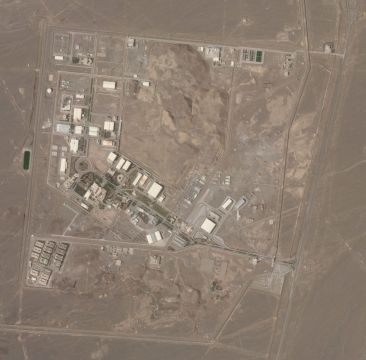Iran’s foreign ministry has blamed Israel for the sabotage attack at its underground Natanz nuclear facility.
Spokesman Saeed Khatibzadeh warned Iran would take revenge over the incident.
The comments represent the first official accusation levelled against Israel over the incident on Sunday that cut power across the facility.
Israel has not claimed responsibility for the sabotage, though Israeli media almost uniformly said that it was the result of a cyber attack.

Few details have emerged about what happened early on Sunday morning at the facility.
The event was initially described as a blackout caused by the electrical grid feeding its above-ground workshops and underground enrichment halls.
If Israel was responsible, it would further heighten tensions between the two nations, already engaged in a shadow conflict across the wider Middle East.
Israeli prime minister Benjamin Netanyahu, who met US defence secretary Lloyd Austin on Sunday, has vowed to do everything in his power to stop the faltering 2015 international nuclear deal with Iran.
Details remained few about what happened early Sunday morning at the facility.
The event was initially described as a blackout caused by the electrical grid feeding its above-ground workshops and underground enrichment halls.
“The answer for Natanz is avenging Israel,” Mr Khatibzadeh said. “Israel will receive its answer through its own path.”
Mr Khatibzadeh acknowledged that IR-1 centrifuges, the first-generation workhorse of Iran’s uranium enrichment, had been damaged in the attack.
State television has yet to broadcast any images from the facility.

Iranian foreign minister Mohammad Javad Zarif separately warned Natanz would be reconstructed with more advanced machines – which that could imperil ongoing talks in Vienna with world powers about saving Tehran’s tattered atomic accord.
“The Zionists wanted to take revenge on the Iranian people over their success on the path of lifting sanctions,” Iran’s state-run IRNA news agency quoted Mr Zairf as saying.
“But we do not allow and we will take revenge on this action from the Zionists.”
The IAEA, the United Nations’ body that monitors Tehran’s atomic programme, earlier said it was aware of media reports about the incident at Natanz and had spoken with Iranian officials about it.
Natanz has been targeted by sabotage in the past. The Stuxnet computer virus, discovered in 2010 and widely believed to be a joint US-Israeli creation, once disrupted and destroyed Iranian centrifuges at Natanz amid an earlier period of western fears about Tehran’s programme.
Natanz suffered a mysterious explosion at its advanced centrifuge assembly plant in July that authorities later described as sabotage.

Iran is rebuilding that facility deep inside a nearby mountain. Iran also blamed Israel for the November killing of a scientist who began the country’s military nuclear programme decades earlier.
Multiple Israeli media outlets reported on Sunday that an Israeli cyber attack caused the blackout in Natanz.
Public broadcaster Kan said the Mossad was behind the attack. Channel 12 TV cited “experts” as estimating the attack shut down entire sections of the facility.
While the reports offered no sourcing for their information, Israeli media maintains a close relationship with the country’s military and intelligence agencies.
“It’s hard for me to believe it’s a coincidence,” Yoel Guzansky, a senior fellow at Tel Aviv’s Institute for National Security Studies, said of Sunday’s blackout. “If it’s not a coincidence, and that’s a big if, someone is trying to send a message that ‘we can limit Iran’s advance and we have red lines’.”
It also sends a message that Iran’s most sensitive nuclear site is “penetrable”, he added.
Mr Netanyahu later toasted his security chiefs, with the head of the Mossad, Yossi Cohen, at his side on the eve of his country’s Independence Day.
“It is very difficult to explain what we have accomplished,” Mr Netanyahu said of Israel’s history, saying the country had been transformed from a position of weakness into a “world power”.
Israel typically does not discuss operations carried out by its Mossad intelligence agency or specialised military units.
In recent weeks, Mr Netanyahu repeatedly has described Iran as the major threat to his country as he struggles to hold onto power after multiple elections and while facing corruption charges.







